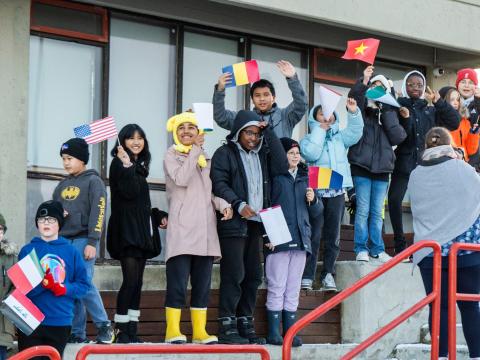
Greatly increased support for children of foreign origin in school and leisure activities has been approved by the city council. Mayor Dagur B. Eggertsson suggested that the recommendations of the head of the School and Leisure Department be implemented in stages, which include that 195 million will be spent on the project this year and nearly 342 million in 2025.
A large increase in the number of children with diverse linguistic backgrounds
The population with a diverse linguistic and cultural background has increased in recent decades, and not least in recent years, and therefore a large increase in the group of children with a diverse linguistic and cultural background. There are considerable differences in population composition between individual neighbourhoods and parts of the city, including challenges and opportunities in school and leisure activities. All children here must get the opportunity and support to develop and use their abilities.
Every year, between 150 and 170 children of primary school age move to Iceland and start school in Reykjavík.
In preschools, the number of children increased from 1,439 in 2020 to 1,646 in 2023. Every year, between 150 and 170 children of primary school age move to the country and start school in Reykjavík. In primary schools, the number of children with a diverse linguistic and cultural background increased from 2,766 in 2020 to 3,592 in 2023. In the last two years, the number of refugees has been added to that group. Between 2021 and 2023, there were 148 children with refugee status in kindergartens and 402 children with refugee status in elementary schools, which calls for more support. Children with disabilities are the fastest growing group in primary schools and there are around 45 children, of which 9 are in Klettaskóli and 9 in the sign language department at Hlíðaskóli. It can be assumed that the number of children with diverse linguistic and cultural backgrounds will continue to increase in kindergartens, primary schools and in leisure activities in Reykjavík.
Necessary to meet urgent tasks
The proposals include that the most urgent projects in the city's elementary schools for children whose mother tongue is not Icelandic will be met systematically. Reykjavík is unique in not receiving special contributions from the Equalization Fund for children whose mother tongue is not Icelandic. In December, the Reykjavík District Court ruled that the Icelandic state was not allowed to abolish the general equalization contribution for children with a mother tongue other than Icelandic in Reykjavík. The state was ordered to pay the city over three billion because of this but has appealed the verdict.
Despite not being paid as much as other municipalities, the city has nevertheless provided significant support in recent years to support children of foreign origin.
A list of the main projects in recent years to support children with a second mother tongue:
- Two multicultural project managers are working in the school and leisure department.
- Welcome to your neighbourhood Kindergarten and elementary school welcome program with the involvement of a service centre and after-school activities.
- A status assessment for newly arrived students (the Swedish assessment tool) has been put into use, but it assesses a child's skills in their own mother tongue and/or in the language in which the child is strongest.
- Centre for Language and Literacy, where two educational consultants work with expertise in reception, adaptation and teaching in Icelandic as a second language, as well as they have also managed and guided establishments regarding position assessment for newly arrived students.
- Three full-time bridge builders who speak Arabic and Kurdish, Polish, Filipino and Ukrainian work in the Center for Language and Literacy.
- Support the Department of Birtu for children in search of international protection.
- Icelandic kindergartens in all parts of the city for children in the 5th - 10th grade who have just moved to the country.
- School resources for students from Ukraine living in temporary housing.
- Free time off for the first three months that a child is in Iceland.
- Funding for kindergartens and primary schools for teaching Icelandic as a second language.
- Various courses for kindergarten and elementary school staff and after-hours in order to promote purposeful teaching of Icelandic as a second language and multicultural working and teaching methods.
Despite these projects and increased support, it is the strong opinion of the School and Leisure Department that there is a need to increase support for individual children and language groups, increase donations to schools with each child and strengthen teaching advice in Icelandic. With the approval of the city council, it has therefore been decided to take further measures to strengthen this group of children.
List of currently approved actions:
Support team for refugee children with a history of high trauma.
- Hiring a Spanish-speaking bridge builder at the Center for Language and Literacy.
- Teaching consultants in Icelandic as a second language in all centres.
- Additional full-time positions in four Icelandic offices.
- The allocation for teaching Icelandic as a second language should be increased to 170,000 per child, as the Equalization Fund pays for children in other municipalities.
- Swimming lessons for middle and junior high school children who are non-swimmers.
- Interpreter pool to support the children and their families.